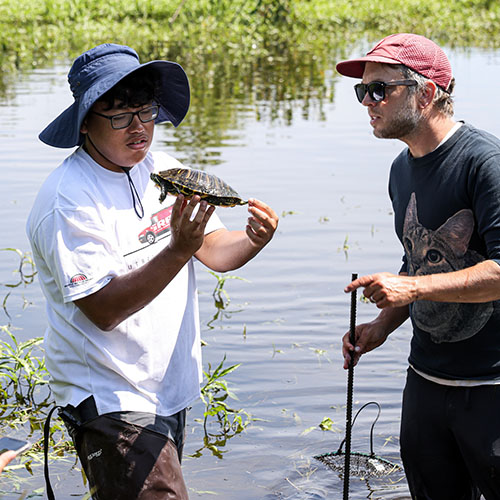Environmental Study: Ecology and Evolutionary Biology
A biological focus on the environment around us
If you're drawn to the scientific exploration of the natural world—collecting species, analyzing DNA, managing ecological data, and conducting lab-based investigations—this major is designed for you. Unlike our other environmental science pathways that center on social justice or sustainability, this track emphasizes the biological and technical dimensions of environmental inquiry.
You'll work closely with biology faculty to develop a robust set of field and laboratory skills. Your studies might lead you into molecular genetics, neurobiology, ecology, or conservation biology. Along the way, you'll be part of a supportive academic community that encourages you to explore the full spectrum of biological sciences and discover the kind of biologist you aspire to be.
From your first courses, you'll engage with authentic research questions—ones that don’t yet have answers. In one introductory class, students investigated the effects of global warming on coral populations, conducted DNA sequencing, and crafted research proposals aimed at expanding global understanding of coral biology.
As an ecology and evolutionary biology major, you'll gain experience in organismal biology, with a curriculum that builds progressively to prepare you for graduate study or careers in the field. You'll gain hands-on experience through fieldwork courses and the opportunity to research with Cornell faculty.
Biology field research
Cornell students regularly participate in one of the longest wildlife research studies in Iowa, running since 1973, studying how humans and climate change impact native turtle populations. Did you know that soil temperature can impact whether there are more male or female turtles hatchlings? Our students do. Watch the video to learn more about their research.
Come visit us on campus and meet with one of our professors to hear about what research opportunities are available to you.
Ecology and evolutionary biology courses and degree requirements
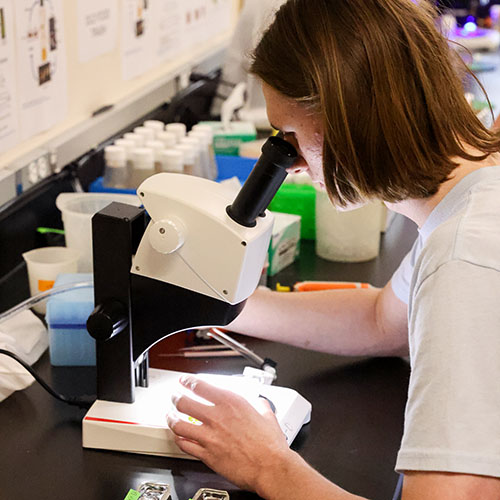
You will find yourself switching between the classroom, the lab, and field work as you learn more about ecological systems and the biological organisms that fuel them. The block plan is uniquely suited this method of study since you can leave campus to study in the field any day without creating conflicts with other courses and your classroom and lab space are dedicated to you and your classmates each block. You will have the opportunity to explore coursework in areas that include cellular biology, organismal biology, botany, population genetics, ecology, entymology evolution, and zoology. You'll also choose interdisciplinary courses across many disciplines that round out your major in what interests you most.
Ecology and evolutionary biology capstone
In this major you will have the option to complete a capstone course in your senior year, or you can substitute a research internhship that includes a written report and a public presentation of your work.
Research in the lab and in the field
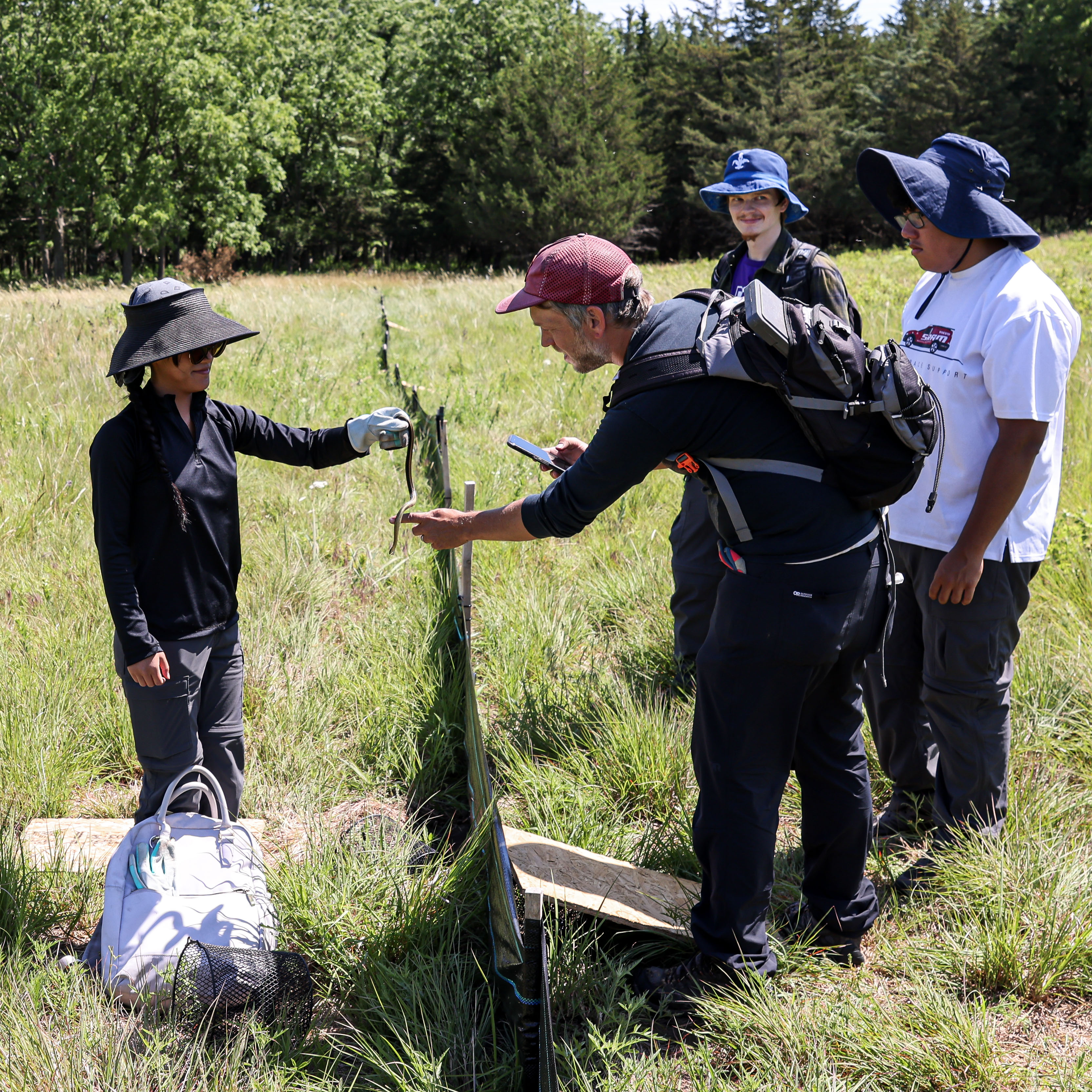
You'll have dedicated lab space in Cornell's science buildings and you'll also spend time in prairies, woodlands, ponds, and streams. Learning about ecology and biology on Cornell's One Course At A Time curriculum means practicing science in “real-time.” Daily labs allow you to immerse yourself into the process of analyzing the molecular genetics of cells and organisms, gathering samples from local ecosystems for lab analysis, and observing plant life in developed lab habitats.
Take advantage of opportunities to collaborate with your professors and other professional biologists. Our faculty are involved in long-term research projects and work collaboratively with students both during the school year and during the Cornell Summer Research Institute. Students frequently present their work at Cornell’s annual Student Symposium or at professional conferences, and some have contributed to papers in scientific journals as undergraduates.
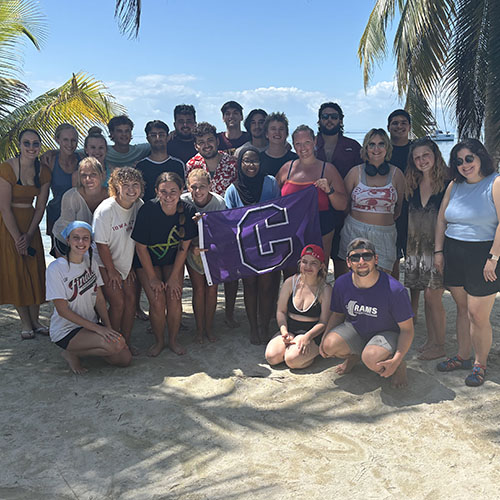
Explore ecology around the globe
The One Course calendar lends itself to the study of biology on extended off-campus trips. Our students pursue off-campus study experiences like:
- Ecology at the Wilderness Field Station in northern Minnesota
- Conservation biology in Costa Rica or the Philippines
- Coral biology in Belize or the Bahamas
- Plant-insect interactions in South American rainforests
Internships in ecology and evolutionary biology
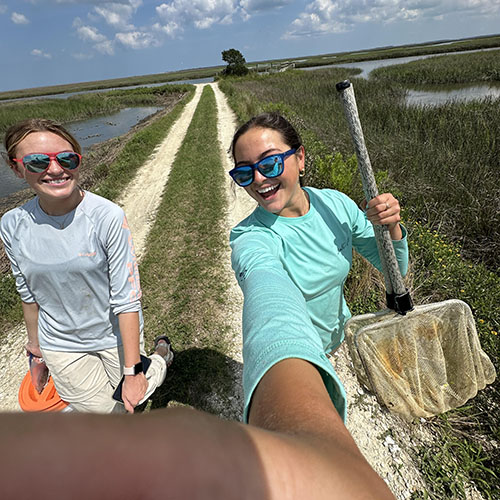
Our students have explored a wide range of future careers through internships near home, across the country, and into the wider world. Examples include:
- Coastal Ecosystem Research at the Baruch Marine Field Laboratory.
- Land Stewardship with the Nature Conservancy of Iowa
- Mote Marine Lab and Big Cat Rescue in Sarasota, Florida.
- Turpentine Creek Wildlife Refuge in Eureka Springs, Arkansas.
- African Conservation Experience, South Africa.
What are Cornell students doing in internships? Check out their blogs.
Career opportunities for ecology and evolutionary biologists
Our alumni go on to work in a diverse range of biological fields and in education teaching biology to others. The U.S. bureau of labor statistics occupational outlook handbook projects a growth rate of 4% for jobs as environmental scientists and specialists over the next 10 years. They reported that there were 90,300 jobs in this category in 2024 and the median pay was $80,640 per year.
Teach the next generation of scientists
Combine your biology major with a secondary education certification and you'll be well on your way to teaching high school biology. If you discover you have a passion for teaching and want to share all that you're learning in biology with budding future scientists, then you should consider secondary education certification. If you're not sure that teaching is the right combination with your biology degree but you're curious, talk to the education faculty, biology faculty, or your academic advisor to discuss what education course might let you explore this possible career path.
The Berry Career Institute can help you identify what you’ll pursue with your understanding of how biological systems impact the world around us and how to find the answers to your own questions through research methods.

